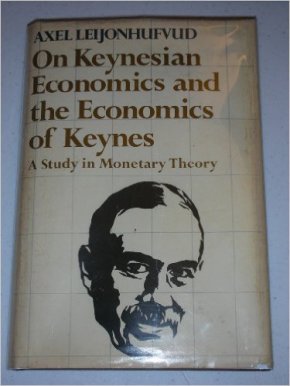[embedded content]Trying to delineate the difference between ‘New Keynesianism’ and ‘Post Keynesianism’ — during an interview a couple of years ago — yours truly was confronted by the odd and confused view that Axel Leijonhufvud was a ‘New Keynesian.’ I wasn’t totally surprised — I had run into that misapprehension before — but still, it’s strange how wrong people sometimes get things. The last time I met Axel, we were both invited keynote speakers at the conference “Keynes 125 Years – What Have We Learned?” in Copenhagen. Axel’s speech was later published as Keynes and the crisis and contains the following thought provoking passages: For many years now, the main alternative to Real Business Cycle Theory has been a somewhat loose cluster of models given the label of New
Topics:
Lars Pålsson Syll considers the following as important: Economics
This could be interesting, too:
Lars Pålsson Syll writes Schuldenbremse bye bye
Lars Pålsson Syll writes What’s wrong with economics — a primer
Lars Pålsson Syll writes Krigskeynesianismens återkomst
Lars Pålsson Syll writes Finding Eigenvalues and Eigenvectors (student stuff)
 Trying to delineate the difference between ‘New Keynesianism’ and ‘Post Keynesianism’ — during an interview a couple of years ago — yours truly was confronted by the odd and confused view that Axel Leijonhufvud was a ‘New Keynesian.’ I wasn’t totally surprised — I had run into that misapprehension before — but still, it’s strange how wrong people sometimes get things.
Trying to delineate the difference between ‘New Keynesianism’ and ‘Post Keynesianism’ — during an interview a couple of years ago — yours truly was confronted by the odd and confused view that Axel Leijonhufvud was a ‘New Keynesian.’ I wasn’t totally surprised — I had run into that misapprehension before — but still, it’s strange how wrong people sometimes get things.
The last time I met Axel, we were both invited keynote speakers at the conference “Keynes 125 Years – What Have We Learned?” in Copenhagen. Axel’s speech was later published as Keynes and the crisis and contains the following thought provoking passages:
For many years now, the main alternative to Real Business Cycle Theory has been a somewhat loose cluster of models given the label of New Keynesian theory. New Keynesians adhere on the whole to the same DSGE modeling technology as RBC macroeconomists but differ in the extent to which they emphasise inflexibilities of prices or other contract terms as sources of shortterm adjustment problems in the economy. The “New Keynesian” label refers back to the “rigid wages” brand of Keynesian theory of 40 or 50 years ago. Except for this stress on inflexibilities this brand of contemporary macroeconomic theory has basically nothing Keynesian about it.
The obvious objection to this kind of return to an earlier way of thinking about macroeconomic problems is that the major problems that have had to be confronted in the last twenty or so years have originated in the financial markets – and prices in those markets are anything but “inflexible”. But there is also a general theoretical problem that has been festering for decades with very little in the way of attempts to tackle it. Economists talk freely about “inflexible” or “rigid” prices all the time, despite the fact that we do not have a shred of theory that could provide criteria for judging whether a particular price is more or less flexible than appropriate to the proper functioning of the larger system. More than seventy years ago, Keynes already knew that a high degree of downward price flexibility in a recession could entirely wreck the financial system and make the situation infinitely worse. But the point of his argument has never come fully to inform the way economists think about price inflexibilities …
I began by arguing that there are three things we should learn from Keynes … The third was to ask whether events provedthat existing theory needed to be revised. On that issue, I conclude that dynamic stochastic general equilibrium theory has shown itself an intellectually bankrupt enterprise. But this does not mean that we should revert to the old Keynesian theory that preceded it (or adopt the New Keynesian theory that has tried to compete with it). What we need to learn from Keynes, instead, are these three lessons about how to view our responsibilities and how to approach our subject.
Axel Leijonhufvud a ‘New Keynesian’? Forget it!
